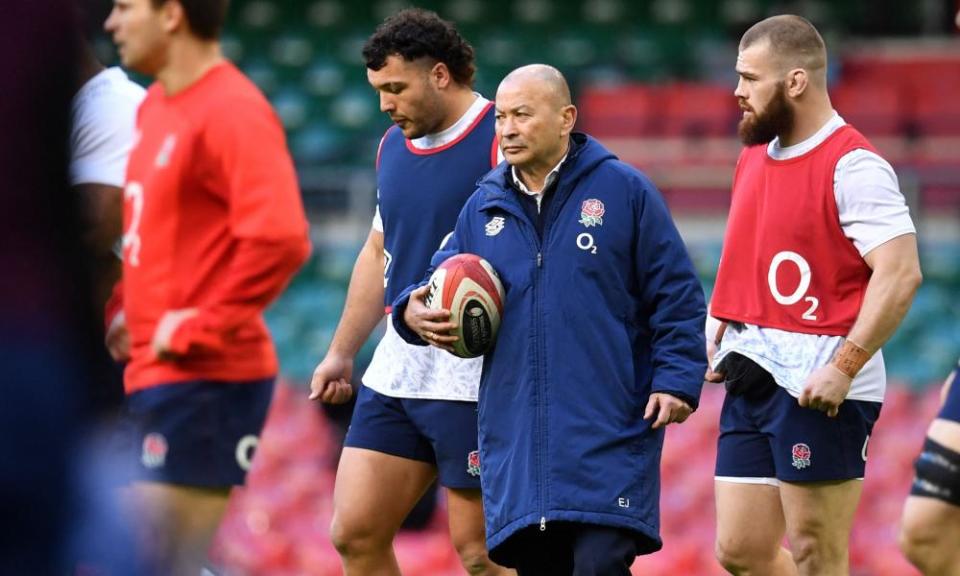Free-flowing Wales shaping up to be unlikely Six Nations champions
At a time unlike any other in living memory, Wales sit at the top of the Six Nations having been written off a month ago. Three wins from three have earned them the triple crown and a tilt at the grand slam in Paris. First they must play Italy in Rome, but the Azzurri have became a depository for opponents to store bonus points and need something even more unlikely than a miracle next Saturday.
Ollie Phillips, a former World Rugby sevens player of the year, summed up the sense of the real and the unreal before Wales’s 40-24 defeat of England: Wales may be rubbish, he thought, but he still fancied them to beat the champions.
Which, of course, they did, by more than their disputed first two tries on a day when the referee, Pascal Gaüzère, detected Maro Itoje’s every misstep but managed to miss Dan Biggar knocking the ball forward five metres as he failed to catch a high kick. It was not the only time the Frenchman’s gaze deceived him, but England did not need his help to come second.
Related: Time for Eddie Jones to consider changes to recalibrate England | Robert Kitson
Wales armed themselves for battle, rarely kicking to touch, packing a presence at the breakdown and, mostly, staying on their feet, tackling with undimmed energy despite the lack of spectators and having an element of surprise that caught out opponents who for too long have been ineffective when needing to react, over-reliant on coaching.
Eddie Jones had been advised to shake up his England side even before defeat in Cardiff. He has used 23 players as starters in the past four matches, with most of the changes enforced, compared with Ireland’s 27 and Wales’s 29. But the issue is less who Jones picks than the mechanical way in which the team operate, so they never reacted to the way Gaüzère was refereeing the breakdown.
In his first two years in charge, Jones regularly said that he looked forward to the day when he and his coaches in effect became unemployed because his players were able to problem-solve on the go and not require water-carriers to invade the field with messages instead of liquid. He never mentions it now, powerless to cure a problem with the English game that long preceded him.

Wayne Pivac’s Wales, in contrast, live off their wits. They had the fortune of enjoying a man advantage against Ireland and Scotland, but they played on England’s vulnerability. If Phillips was overly harsh in dismissing as rubbish a side boasting Alun Wyn Jones – rugby’s Spartacus – George North, Taulupe Faletau, Liam Williams, Josh Navidi and the emerging Louis Rees-Zammit, Wales did go through 2020 without beating any nation in the world’s top 10.
When Wales secured the grand slam in 2005, they had won three of their previous 16 matches in the Six Nations, with those being against Scotland and Italy. The success proved a one-off but that foundation allowed Warren Gatland to build lasting success later. Now they are like a driver occupying the middle lane of a motorway, observing the speed limit while those who zoom past soon break down or, as in the case of England, are pulled over by the law.
Wales carry on at their own pace. Victory in Rome would mean they can be caught only by the winner of the postponed match between France and Scotland in Paris. The French have got away with at least one breach of the Covid-19 protocols, ironic given the noise the government there made before the tournament about the risk of playing in Britain and Ireland. A new date for that game is being negotiated. Given that the next international window is not until the summer, Scotland should have been awarded the points, never mind that they have not won in Paris this century.
It is 16 years since France won a Six Nations match at Twickenham, their destination next Saturday three months after disputed refereeing decisions went England’s way in the Autumn Nations Cup final. If under Fabien Galthié an expressive and eye-catching Les Bleus have seemed redolent of a bygone era, they are more like the All Blacks under Graham Henry and Steve Hansen, aware that a game often comes down to a few plays.
France do not work through phases for the sake of it, kicking when nothing is on and waiting to be presented with an opportunity to strike in broken play. England are more structured but when their power game is repelled, they have nowhere else to go.
A few years ago, Jones called his replacements finishers, but the backs on the bench this year have been more like nonstarters, introduced when the contest is all but finished: despite Elliot Daly continuing his run of indifferent form in Cardiff, there were only five minutes to go when Max Malins replaced him, the game up.
Scotland find themselves below England despite their opening-round victory at Twickenham, albeit with a game in hand. Ireland visit Murrayfield a week on Sunday with Scotland needing victory not just to sustain their title challenge but as a response to the self-inflicted defeat to the leaders in their last outing. Wales are highly likely to be 14 points ahead of them by then, unlikely champions at an unreal time.

 Yahoo Finance
Yahoo Finance 